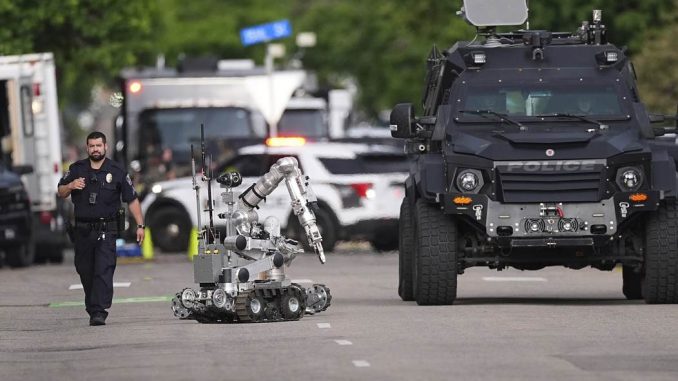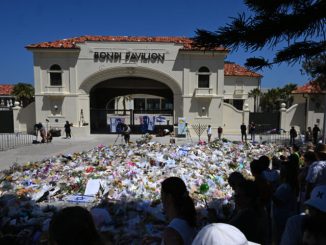
| Published June 3, 2025
Mohamed Sabry Soliman, a 45-year-old Egyptian national, allegedly carried out a firebomb attack on a pro-Israel demonstration in Boulder, Colorado. During police interviews, Soliman reportedly expressed his intent to kill all participants, whom he referred to as a “Zionist group,” and stated he would commit the act again without remorse. He admitted to planning the attack for over a year, citing ideological motivations linked to the Israeli-Palestinian conflict. Soliman also disclosed that he had attempted to purchase a firearm but resorted to using Molotov cocktails after being denied due to his immigration status.
The attack injured 13 individuals, including elderly participants and a Holocaust survivor. Authorities recovered 16 additional incendiary devices at the scene. Soliman faces multiple charges, including attempted murder and federal hate crimes, and is currently held on a $10 million bond.
This incident has intensified discussions on immigration enforcement and the rise of ideologically motivated violence in the United States.
I’ll just leave this here for @RepRaskin.
“He said that he had previously tried to purchase a firearm, but resorted to the Molotov cocktails when he could not purchase a gun because he was not a legal citizen.” https://t.co/ap61Dj0rlO pic.twitter.com/GdS6VnqQOC
— Gunther Eagleman™ (@GuntherEagleman) June 2, 2025
🔍 Implications of the Boulder, Colorado Attack
1. National Security and Immigration Scrutiny
Mohamed Soliman was in the U.S. illegally, having overstayed a student visa. His ability to live undetected for years raises serious concerns about visa overstay enforcement and gaps in DHS monitoring.
Expect renewed political pressure to tighten vetting, tracking, and deportation processes, especially for individuals from conflict regions or countries of concern.
—
2. Rise in Ideologically Motivated Domestic Terrorism
Soliman reportedly told police he wanted to “kill all Zionists” and would “do it again.” This case will likely be classified as a hate-driven terror attack, contributing to the broader trend of ideologically motivated violence—both from Islamist extremists and other radical actors.
U.S. federal agencies may increase focus on lone-wolf terrorism, especially those inspired by foreign conflicts like Israel-Palestine.
—
3. Increased Polarization Around Israel-Palestine Debate
The attack on a pro-Israel rally, carried out with ideological and religious motivations, will likely escalate tensions on U.S. soil around the Israel-Palestine conflict.
Protests, counter-protests, and university activism may now be met with harsher legal and security responses, especially where safety risks are involved.
—
4. Legal and Political Fallout
Prosecutors are pursuing federal hate crime and attempted murder charges, which could set legal precedent for dealing with foreign nationals who commit ideologically motivated violence on U.S. soil.
This may also fuel debates about weaponized immigration rhetoric in the 2026 election cycle, with both parties responding to demands for reform—but from very different angles.
—
5. Reevaluation of Public Event Security
Authorities may call for heightened security at political rallies, especially for ethnic or religious groups. More surveillance and protective measures could follow at synagogues, mosques, or culturally sensitive events.
🧭 Overall Takeaway:
The Boulder, Colorado firebomb attack is a stark reminder that foreign ideological conflicts are increasingly spilling onto U.S. soil, with deadly consequences. Mohamed Soliman’s alleged admission—that he planned to kill “Zionists” and would do it again—reveals not just a lone act of violence but a growing security threat from radicalized individuals operating within U.S. borders, often under the radar due to lax immigration enforcement.
This incident exposes serious vulnerabilities in the immigration system, underscores the evolving nature of domestic terrorism, and intensifies polarization around the Israel-Palestine issue in American discourse. It also raises uncomfortable questions about how prepared U.S. institutions are to detect and stop ideologically driven violence before it erupts—especially when rooted in foreign political and religious narratives.
In short: America’s ideological fault lines are widening—and now, they’re combustible.
SOURCES: REDSTATE – More Boulder Terror Attack Info: What They Found in Suspect’s Car, What Else He Allegedly Told Them
ABC NEWS – Boulder attack suspect charged with federal hate crime, said he ‘wanted to kill all Zionist people’: Court documents
AL JAZEERA – Colorado rally attack suspect charged with federal hate crime in US
THE INDEPENDENT – Mohamed Soliman: Colorado fire attack suspect told Boulder police he’d do it again and targeted ‘Zionist group’





Be the first to comment